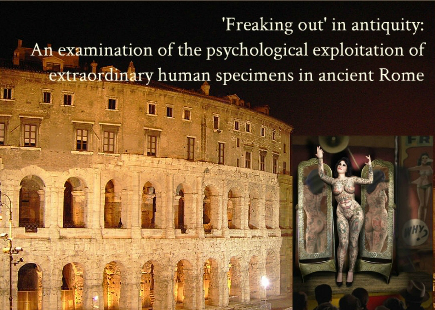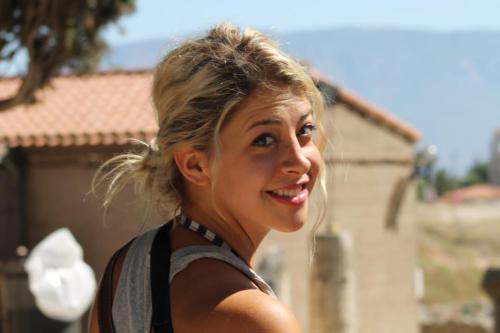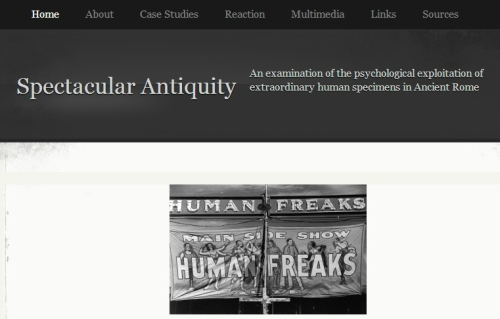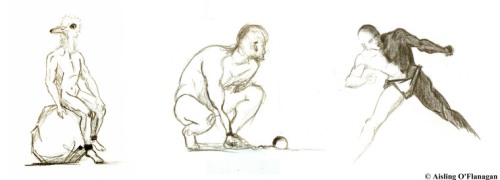This is our second interview with one of the graduate students involved in Prof. Siobhán McElduff’s class on Roman Spectacle. Chelsea is a third-year Ph.D. student in Classical Archaeology at UBC, and is actually responsible for getting the ball rolling on our current efforts to digitize the artifact and squeeze collections in the Department of Classical, Near Eastern and Religious Studies.
For her project she created a website, Spectacular Antiquity, to look at how the human body was used “as a spectacle in and of itself and the psychological aspects involved in exploiting individual persons for visual display.”
First, can you give a brief description of your project?
My project looked at the exploitation of human beings in antiquity, specifically people who were put on a form of display solely on the basis of their physical anomalies. Basically, I was exploring the idea of an ancient freak show: how, why, and in what circumstances ancient Romans stared at and reacted to the unusual, the deformed, the ‘other’. The questions I was interested in were: how were individual persons made into spectacles, and what is the psychological motivation for visually exploiting a fellow human being on the basis of physical deformity? I applied these questions to the Roman world and used evidence from ancient literature and modern psychological studies. My results were presented in the form of a website – an easily replicable, open-access format available to anyone interested in the topic!
Did you have a prior interest in the subject or did you choose the topic based on what could best be presented digitally?
I had my topic in mind before I chose a digital means for the presentation of the research: I read a passage from Lucian’s ‘Literary Prometheus’ in which a man and a camel are put on display in front of a crowd of people in a theatre because of their unusual appearances; the audience reacts with horror and the spectacle is a complete failure. This passage provided the impetus to research the notion of ‘freaks’ in antiquity…that, and the fact that I’ve had a slight fascination/obsession with sideshows and all things circus-related since I was little kid. I mean…who doesn’t love a good freak show?
What resources did you use? Did you have prior knowledge of these resources?
Having just admitted inclination towards freak-shows, I (not-surprisingly) knew where to find a good amount of material related to the early modern sideshow. And, like so many other starry-eyed teenagers, I began my academic career as a psychology major, so I knew exactly where to look for recent studies on the topic of psychological motivation. The ancient Latin sources proved a bit more challenging, as I am staunchly a Greek archaeologist, but I had lots of helpful advice and direction finding relevant sources to analyze.
What was the most challenging aspect of the project?
Definitely deciding how to present this very traditional academic research in a way that was visually appealing and accessible to a wide audience. I still have very little concept of whether I was successful in this aspect, but I like to think that the website isn’t a terrible eyesore and is somewhat fun to click around!
What was the most enjoyable aspect of the project?
Is it cliché to say that the most challenging aspect was also the most enjoyable? Because I was dealing with literary sources, I had a serious lack of visual resources to use on the website – as someone who deals primarily with material culture elsewhere in my research, this was an unfamiliar problem for me to have to face. One of the best parts of this project for me was sifting through open-access images and selecting the most appropriate photos and drawings to illustrate various aspects of the research. I even went so far as to contact a friend of mine who is an artist and commissioned drawings of some of the ‘freaks’ described in the literature – the piebald man, the ostrich-headed man, and one of the unfortunate prisoners from the monster-market. Visualizing these images and then having them become reality was an awesome and extremely satisfying experience.
Would you undertake a similar project again, now that you are familiar with the process?
Unless I find a topic that would, indisputably, ideally be presented in this format, I think my answer would have to be probably not – the reason isn’t because the project was unfulfilling or unsuccessful (at least, I hope it was successful!), but because I think that creating this website as a digital venue for presenting information will function as a stepping stone for me into the larger world of the Digital Humanities. I loved this project, but now that it is complete it’s time for me to move on, to keep pushing myself to confront new challenges and to learn new skills. I look at the creation of this website as a baby step over the threshold of digital information sharing and am eager to see what lies ahead.
Do you intent to maintain the site you created, or add content in the future?
Absolutely. I feel strongly about the responsibility we all have to our digital projects – far too often websites and other digital media are created and subsequently neglected, resulting in irrelevant and out-of-date information that is still very much in existence on the web. I created this website so that it would require minimal maintenance, but I plan to add information and links to it as appropriate. I am very aware that this website will be attached to my name for as long as it exists on the internet, and therefore I have a vested interest and responsibility not only to maintain it, but to ensure that it remains something that I am proud of!
Do you think this project was an effective way to study/teach about your topic?
I hope so! The primary motivating goal of this project was to create something that would be accessible to everyone who might be interested, rather than restricting academic research to an academic audience. I was also focused on encouraging others to brave the world of Digital Humanities and as part of the website I included a How-To Guide, so that anyone interested in replicating the presentation of my website would be able to do so in its entirety. The acquisition of knowledge shouldn’t be competitive – through honest information sharing we do not put ourselves at a disadvantage, but we create invaluable networks and make ourselves open to infinite possibilities.
Any final thoughts or comments?
I love quotes so much (almost as much as freak shows and the circus!) that I’ll end with a quote pulled from a study on why the human brain becomes fixated on things that are ‘different’ – it just so happens to double as what I think is perfect advice to anyone hesitant to try something new:
“You may not always like novelty, but your brain does.” – G. Berns, 2006
What is your favorite word? Conglomerate. Just say it, it’s the best.
What is your least favorite word? Let’s just say it is NOT appropriate to type here…so my least favourite ‘PC’ word would have to be ‘nice’. Or ‘interesting’. My fourth-grade teacher Mr. Lyons once taught me that only lazy people use the descriptors ‘nice’ and ‘interesting’. I hope I’m never described as either.
What turns you on? The Ocean. Water. Novelty. Adventure. Singing. Dancing. Being Outside. Everything?
What turns you off? Monotony.
What sound or noise do you love? The ocean! Double points for using this answer twice?
What sound or noise do you hate? Any two sounds at once. Wait, that makes me sound crazy! Two different music sources playing at the same time.
What is your favorite curse word? Can I type this? Fuck, of course I can!
What profession other than your own would you like to attempt? Movie star. I’d be such a good famous person. But, realistically, I probably should have been a lawyer.
What profession would you not like to do? Anything in a cubicle without a window.
And finally,









